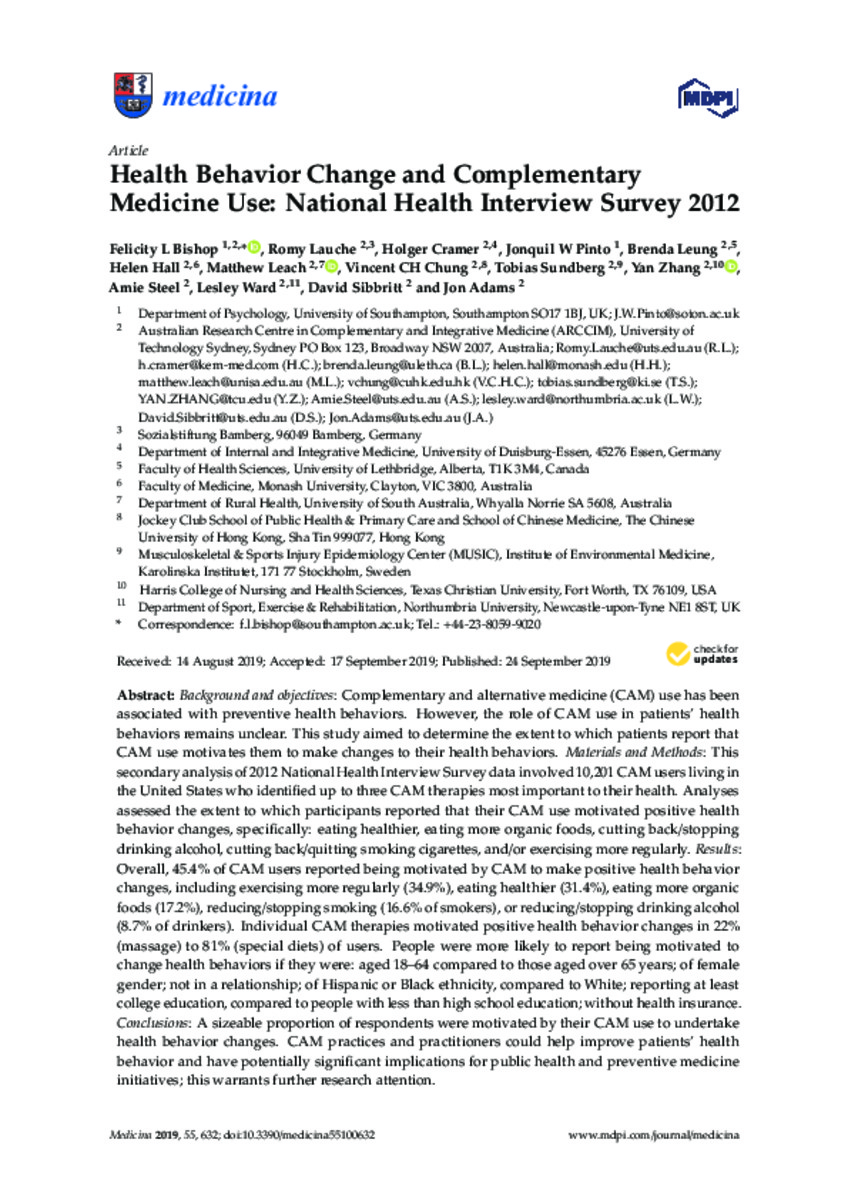Health Behavior Change and Complementary Medicine Use: National Health Interview Survey 2012Show full item record
| Title | Health Behavior Change and Complementary Medicine Use: National Health Interview Survey 2012 |
|---|---|
| Author | Bishop, Felicity L; Lauche, Romy; Cramer, Holger; Pinto, Jonquil W; Leung, Brenda; Hall, Helen; Leach, Matthew; Chung, Vincent CH; Sundberg, Tobias; Zhang, Yan; Steel, Amie; Ward, Lesley; Sibbritt, David; Adams, Jon |
| Date | 2019-09-24 |
| Abstract | Background and objectives: Complementary and alternative medicine (CAM) use has been associated with preventive health behaviors. However, the role of CAM use in patients' health behaviors remains unclear. This study aimed to determine the extent to which patients report that CAM use motivates them to make changes to their health behaviors. Materials and Methods: This secondary analysis of 2012 National Health Interview Survey data involved 10,201 CAM users living in the United States who identified up to three CAM therapies most important to their health. Analyses assessed the extent to which participants reported that their CAM use motivated positive health behavior changes, specifically: eating healthier, eating more organic foods, cutting back/stopping drinking alcohol, cutting back/quitting smoking cigarettes, and/or exercising more regularly. Results: Overall, 45.4% of CAM users reported being motivated by CAM to make positive health behavior changes, including exercising more regularly (34.9%), eating healthier (31.4%), eating more organic foods (17.2%), reducing/stopping smoking (16.6% of smokers), or reducing/stopping drinking alcohol (8.7% of drinkers). Individual CAM therapies motivated positive health behavior changes in 22% (massage) to 81% (special diets) of users. People were more likely to report being motivated to change health behaviors if they were: aged 18-64 compared to those aged over 65 years; of female gender; not in a relationship; of Hispanic or Black ethnicity, compared to White; reporting at least college education, compared to people with less than high school education; without health insurance. Conclusions: A sizeable proportion of respondents were motivated by their CAM use to undertake health behavior changes. CAM practices and practitioners could help improve patients' health behavior and have potentially significant implications for public health and preventive medicine initiatives; this warrants further research attention. |
| Link | https://doi.org/10.3390/medicina55100632
https://repository.tcu.edu/handle/116099117/35814 https://www.mdpi.com/1648-9144/55/10/632 |
| Subject | health behavior
complementary and alternative medicine health attitudes motivations lifestyle |
Files in this item
This item appears in the following Collection(s)
- Research Publications [837]
Related items
Showing a few items related by title, author, creator and subject.
-
HEALTH INSURANCE LITERACY IN TCU: EXAMINING THE DIFFERENCE IN HEALTH INSURANCE KNOWLEDGE BETWEEN INTERNATIONAL AND DOMESTIC COLLEGE STUDENTS AND ADDRESSING THE NEEDS OF HEALTH INSURANCE EDUCATION FOR INTERNATIONAL STUDENTS
Ta, Lily (2023-05-19)International students are increasing in U.S. academic institutions and are making great contributions to the U.S. Economy. As the number of international students experiencing health and financial problems is growing, it ... -
For patients who identify as LGBTQ+ in the DFW area, does having access to a LGBTQ+ health and community center and healthcare providers who are well-trained in LGBTQ+ health and wellness (and understand the need for specific and centered treatment in said patients) lead to stronger patient satisfaction, education, and health outcome in comparison to when those same patients visit general primary care physicians?
Garg, Vandana (5/1/2023)Research Question: For patients who identify as LGBTQ+ in the DFW area, does having access to a LGBTQ+ health and community center and healthcare providers who are well-trained in LGBTQ+ health and wellness (and understand ... -
Health threats deconstructed: components of health threats and their effects on disease avoidance
Prokosch, Marjorie L. (2018)Health threats (e.g., pathogens and parasites) have historically exerted powerful selective pressures upon human survival and reproduction. In response, humans have evolved a wide array of biological and psychological ...
© TCU Library 2015 | Contact Special Collections |
HTML Sitemap







